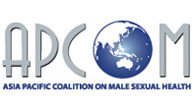The following is a statement from the Asia Pacific Coalition on Male Sexual Health (APCOM) issued on World AIDS Day (Dec 1):

“The incidents in question have occurred in every sub-region and numerous countries, including Cambodia, China, India, Indonesia, Nepal, Malaysia and the Philippines,” noted Shivananda Khan, APCOM Chairperson and Chief Executive of Naz Foundation International.
“Sometimes they are isolated incidents acted out by local police seeking things other than mere justice. But in many instances, they are part of what can only be called a campaign of hate and discrimination directed at the most vulnerable of citizens.This is all the more shameful and sad because it undermines progress that is being made and negates the good work of those officials and authorities who are trying to help.”
"APCOM strongly believes that open dialogues is a first step towards ensuring that all people across Asia and the Pacific and the world, irrespective of sexual orientation or gender identity, can access HIV prevention, care, and treatment services for HIV," said Midnight Poonkasetwatana, APCOM Board member representing the Greater Mekong Sub-region.
"The need is for an environment free of government-sanctioned stigma, discrimination and criminalization," explained Roy Wadia, Executive Director, Heroes Project (India) and APCOM Communications Advisor. "The next step is for governments and authorities, in partnership with communities, to begin rectifying laws and harmonising legal practices and policies intended to help efforts to address HIV, strengthen public health for all, and most importantly save many lives from being lost."
These are just some of the actions taken by authorities against MSM and transgender people that have been reported in Asia Pacific over the past year:
- In Phnom Penh, Cambodia, transgender and female sex workers have been continually harassed by police citing anti-trafficking laws and forcing sex workers into streets and parks where physical dangers increase and access to private spaces and safe sex commodities are limited or non-existent.
- In Beijing, China, police swept through Mudanyuan Park, a popular hangout, taking some 80 people into custody to be photographed, fingerprinted and reportedly forced to undergo blood tests.
- In Hong Kong, China, a transgender woman (male to female) was denied the opportunity to marry a man in a high-profile case that tested the special administrative region’s commitment to human rights.
- In North Delhi, India, a transgender woman was reportedly physically and sexually assaulted when taken to the Beggars House (a prison for people begging for food and money on the streets); reports of such assaults are received regularly.
- International, national and local community delegates in Surabaya, Indonesia at the Fourth ILGA - Asia Regional International Lesbian, Gay, Bisexual, Transgender and Intersex Association Conference were attacked in the conference hotel, forcing the cancellation of the meeting. Fundamentalist and hard-line Islamic groups in full view of local police, who refused to intervene, perpetrated the attacks.
- Recently in Melaka, Malaysia, as in Penang and Butterworth earlier in the year, local police raided privately operated “spas” and gyms, harassing patrons and, at times, charging them with indecent public behaviour (one such example reported was “being naked while taking a shower”).
- In Pasay City, Philippines, the local police raided a legitimately operated gay/bisexual establishment, arresting and detaining over 100 patrons and staff. They were charged with violating the Anti-Human Trafficking Law (RA 9208) and a city ordinance against “male prostitution”, citing the presence of condoms and lubricants as evidence of the charges. Police were reported to have confiscated mobile phones, extorted “fees” and abused the patrons.
According to the recent Legal environments, human rights and HIV responses among men who have sex with men and transgender people in Asia and the Pacific: An agenda for action report jointly produced by UNDP and APCOM earlier this year, 19 out of some 49 countries in this region currently criminalize male to male sexual behaviour, while other arbitrary and inappropriate legal provisions are used to violate the human rights and dignity of MSM and transgender people. These punitive laws and selective, discriminatory enforcement practices dramatically reduce the effectiveness of national HIV responses, and obstruct advocacy, outreach, and delivery of life-saving HIV and health services in these communities.
To address these access issues and achieve rights-based universal coverage, APCOM has demonstrated that strategic partnerships are required among affected communities, the legal profession, health care providers, human rights bodies, parliamentarians and other policy makers, including religious leaders, faith-based organisations and the media. To that end, APCOM will support the efforts of the recently formed Global Commission on HIV and the Law, by facilitating community participation in the first Commission Regional Dialogue, for the Asia Pacific, scheduled for February 2011 in Bangkok. APCOM’s initiatives parallel the objectives of the Commission, and its work APCOM feeds into this crucial effort.
“The theme of World AIDS Day 2010 is Universal Access and Human Rights. As a regional coalition advocating for universal access for MSM and transgender people to HIV and community-appropriate services, good health and a productive life, APCOM joins with its international partners in demanding an end to these harmful actions,” said Steven Gu, APCOM Executive Director. “Such actions have direct, adverse impacts on HIV prevention, treatment, care and support. Further, existing laws and ordinances pertaining to human trafficking and sex work must be reviewed, and appropriate policies and guidelines formulated regarding possessing condoms.”
The Asia Pacific Coalition on Male Sexual Health (APCOM) is a regional coalition of MSM and HIV community-based organisations, the government sector, donors, technical experts and the UN system. The main purpose is advocating for political support and increases in investment and coverage of HIV services in Asia Pacific. APCOM promotes principles of good practice and lessons learnt by bringing together representatives from diverse groups in an effort to share experience, knowledge and expertise.
